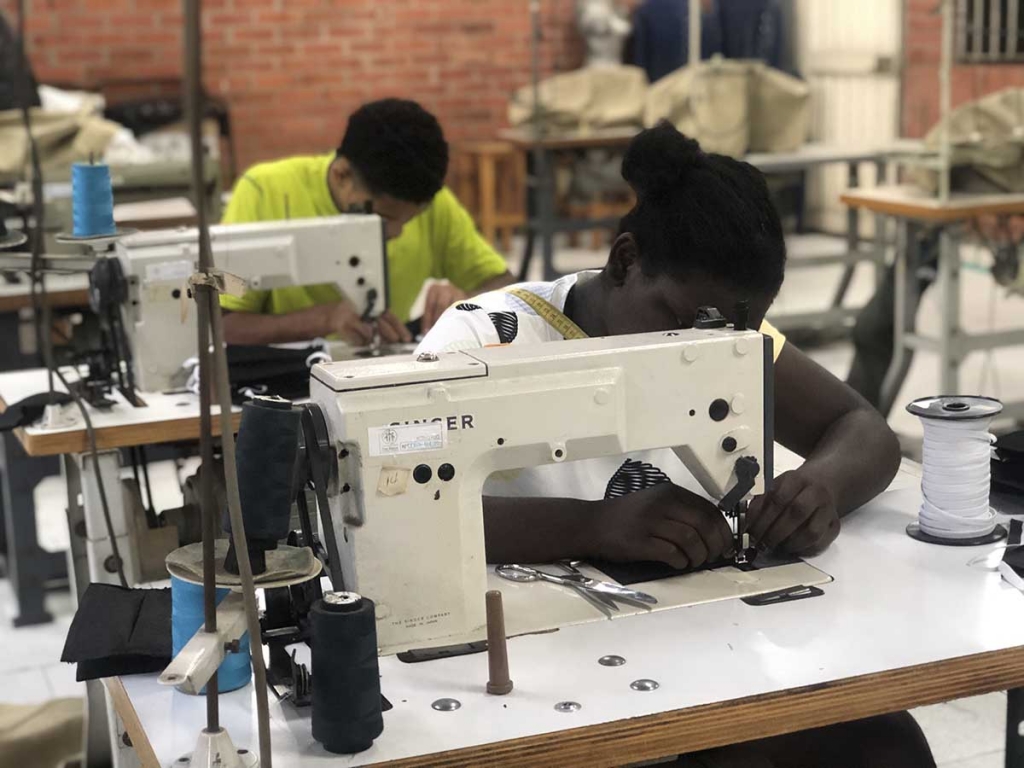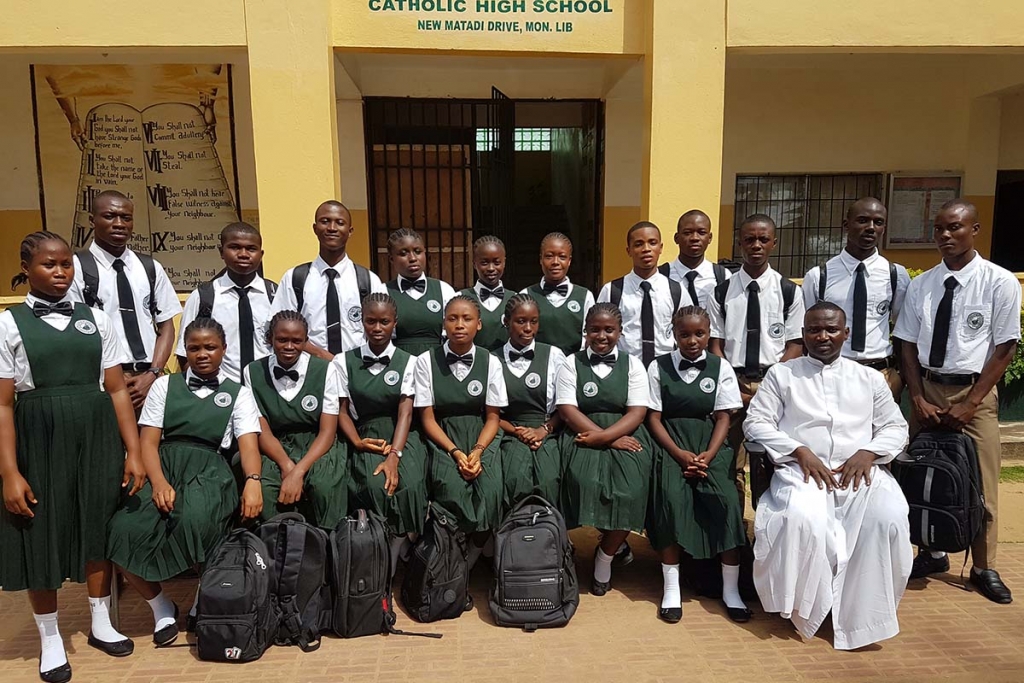INT’L DAY AGAINST THE USE OF CHILD SOLDIERS: Salesian Missions highlights educational and social programs for child soldiers

At least 46 United Nations member states still recruit children under the age of 18 into their armed forces
(MissionNewswire) Salesian Missions, the U.S. development arm of the Salesians of Don Bosco, joins humanitarian organizations and the international community in honoring Feb. 12 as Red Hand Day, also known as the International Day against the Use of Child Soldiers. The day was started when the Optional Protocol to the Convention on the Rights of the Child on the Involvement of Children in Armed Conflict entered into force on Feb. 12, 2002. This protocol was adopted by the General Assembly of the United Nations (U.N.) in May 2000 and has been ratified by 168 U.N. member states.
In 2001, the U.N. Security Council sent a powerful message to the world that the recruitment of child soldiers would no longer be tolerated. Resolution 1379 requested the U.N. secretary-general to attach an annex to his report on children and armed conflict, in which he would list parties to conflict who recruit and use children in situations on the U.N. Security Council’s agenda. Subsequent resolutions added four additional triggers for listing: sexual violence, killing and maiming, attacks on schools and hospitals, and abduction of children.
The first Child Soldiers World Index was launched in 2018 by Child Soldiers International, a human rights group. This provided the first comprehensive worldwide resource on child recruitment. The World Index covers all 197 U.N. member states and includes more than 10,000 data points, including data on national laws, policies, and child recruitment practices worldwide. Currently, at least 46 states still recruit children under the age of 18 into their armed forces. In addition, there have been at least 18 conflict situations in which children have participated in hostilities.
The poverty and lack of opportunities brought about by the COVID-19 pandemic have created more situations of children at risk for recruitment by armed forces and armed groups, or for sexual violence or abduction. Education opportunities that have already been disrupted by war and displacement are further vanishing, leaving children vulnerable.
“Children utilized in hostilities and war have faced unimaginable violence and abuses and need our support to have a second chance in life,” said Father Gus Baek, director of Salesian Missions. “In countries around the globe, Salesian missionaries work with former child soldiers so that they may overcome the traumas of war and reintegrate into society.”
In honor of International Day against the Use of Child Soldiers, Salesian Missions is proud to highlight programs that help child soldiers by offering education and psychosocial support.
COLOMBIA

Don Bosco Vocational Training Center teaches skills for employment to former child soldiers in Colombia.
Salesian missionaries are giving hope for a better life to former child soldiers at the Don Bosco Vocational Training Center (Don Bosco Center) in Cali, Colombia*. The country’s guerrilla warfare has caused more than 300,000 deaths and fueled the growth of powerful drug cartels.
The Don Bosco Center provides a chance at rehabilitation for youth who have been ripped from their families at a young age and forced to shoot, throw bombs, or become servants of officers and sexually abused.
Upon arrival at the Don Bosco Center, youth are given a uniform and tools that correspond to the profession they have chosen to learn. More importantly, they are given a chance to reclaim their personal identity and begin to rebuild their self-esteem and trust in others.
Don Bosco Center has a team of professionals who help youth establish a training plan. Youth can take coursework to become electricians, industrial mechanics, automobile repair technicians, cooks, tailors, beauticians, welders, computer operators, accountants, librarians or commercial secretaries. Workshops serve as the cornerstone of development. Youth learn safety regulations, handle machines and products, and take life skills training to help personally and professionally.
Currently, five Salesians support 30 youth in the program. For security reasons, youth live at the center. Their names have not been deleted from the lists held by the guerrilla leaders, who aim to send them back into service or seek revenge for leaving. In the center, youth learn to re-adapt to normal living—sharing a meal with friends, having free time and understanding the rules of peaceful coexistence. During the COVID-19 pandemic, these youth stepped up and put their new-found skills to use creating masks for those in the city.
LIBERIA

In Liberia, Mary Help of Christians School provides a foundation of education and support to former child soldiers.
Operated by Salesian sisters, Mary Help of Christians School provides a foundation of education and support for young students who would otherwise have limited opportunities—many of whom are former child soldiers. The school started in 1993 and serves just over 560 students. The school also has a feeding program, which serves more than 100 students each day.
This is one of many schools that Salesian missionaries operate in Liberia. Salesians have been present in Monrovia since 1979 and manage parishes, youth centers, schools and oratories.
In 2019, Don Bosco Technical High School, also in Monrovia, launched a vocational training course for electro-technicians. An afternoon class is available to high school students, which complements their current educational path. There is also a morning class for young workers to help them obtain certification to improve their options in the workforce.
The launch of the electro-technician training was part of an initiative that included the renovation of existing space at Don Bosco Technical High School to transform it into a workshop. The initiative aimed to respond to the needs of the labor market while ensuring youth have access to vocational and technical training that assists them in finding long-term stable work. The electro-technician course is available each year to 90 high school students and 30 uncertified electricians.
MALI

In Mali, the Salesian Père Michael Training Center provides support to hundreds of youth and works as a deterrent for children being recruited as child soldiers.
The Salesian Père Michael Training Center in Bamako, the capital and largest city of Mali*, is bringing joy, providing education, and cultivating peace among children and older youth. The center keeps its doors open all day and provides support to hundreds of youth from the Niarela district and the outskirts of the city. It also works as a deterrent for children being recruited as child soldiers.
Youth come to the center to play sports, learn music or study at its library. The center provides a safe haven where youth have an opportunity to live, dream of a future, study, and learn the importance of being committed and collaborating in groups. They are able to express themselves freely and access the support of adults.
The goal is to keep young people, ages 12-25, away from the street and harmful habits such as alcohol or drugs. Instead, youth are offered an educational space during their free time which promotes cultural activities and allows the development of values. Salesian missionaries have been able to access sports equipment for the girls basketball team, set up a music training center, and organize health and hygiene awareness days to prevent diseases and promote a healthy lifestyle.
###
Sources:
ANS Photos (usage permissions and guidelines must be requested from ANS)
COLOMBIA: 30 former child soldiers rebuild trust in others
LIBERIA: Salesian-run Mary Help of Christians School educates 560 students each year
MALI: Center provides safe haven for youth
*Any goods, services, or funds provided by Salesian Missions to programs located in these countries were administered in compliance with applicable laws and regulations, including sanctions administered by the U.S. Department of Treasury’s Office of Foreign Asset Control.




